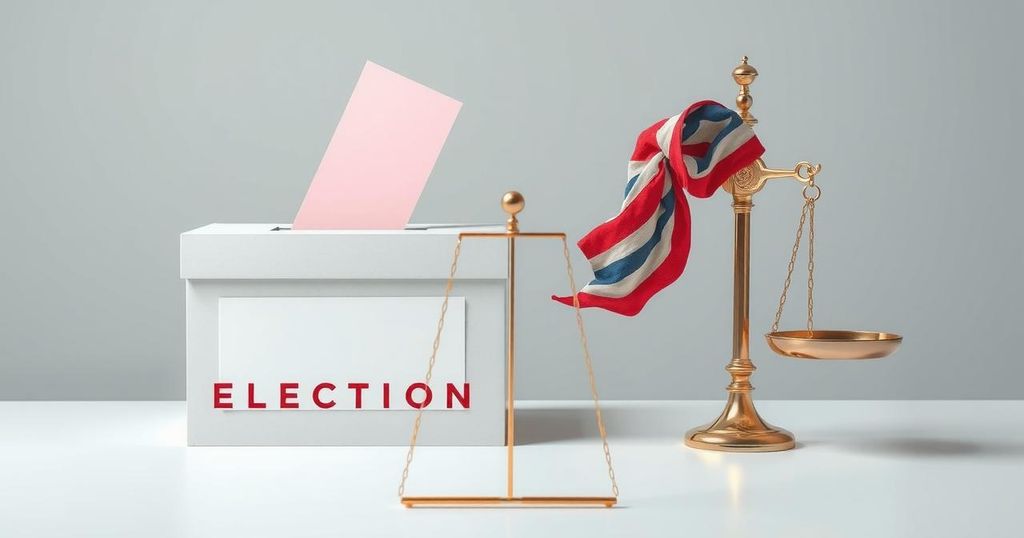Ecuador’s Election Approaches Run-off as Noboa and Gonzalez Clash

Ecuador’s election outcome hangs in the balance as President Noboa leads challenger Luisa Gonzalez by a slim margin. Gonzalez celebrates a significant accomplishment in forcing a potential run-off election. The election has raised critical issues related to security, crime, and the economy amidst rising cartel violence that has transformed the nation. The results impact both local governance and international relations regarding immigration and economic support.
Ecuador’s election has entered a tense phase, with incumbent President Daniel Noboa holding a narrow lead over leftist competitor Luisa Gonzalez, following the counting of over 90% of votes. Noboa garnered 44.3% against Gonzalez’s 43.8%. Despite trailing in pre-election polls, Gonzalez declared a significant achievement by forcing a possible run-off, or what she terms a “statistical tie.” The election results are viewed as a pivotal judgment on Noboa’s handling of the country’s violence and economic dilemmas.
In recent years, Ecuador’s safety has deteriorated dramatically due to cartel violence, shifting from a safe nation to one grappling with alarming crime rates. Noboa’s administration has responded to this turmoil with significant military intervention, declaring a state of emergency to tackle issues such as murder and kidnapping. On election day, additional military forces were deployed to polling locations, reflecting the high stakes of maintaining security amid a backdrop of previous political violence, including the assassination of a candidate in 2023.
Nonetheless, the election proceeded without major incidents except for a few infractions of an imposed alcohol ban. Approximately ten million votes have been counted thus far, with full results pending. Supporters of Noboa celebrated in major cities, expressing their desire for his continued leadership to effect positive change. Meanwhile, Gonzalez’s influential political mentor, former President Rafael Correa, remained optimistic about their chances of winning.
At just 37 years old, Noboa represents a younger generation of leaders taking a firm stance on crime and showcasing a modern campaign style focused on youthfulness. However, this approach raises concerns, with human rights advocates pointing out potential abuses stemming from military actions. Political analysts suggest Ecuador is in a severe crisis, recalling events from nearly fifty years ago during prior democratic turmoil.
The widespread unrest has deterred tourism and foreign investment, contributing to a looming recession in the nation. Noboa has sought assistance from the International Monetary Fund (IMF) for financial stability. Gonzalez assured that she would welcome the IMF’s involvement, asserting her commitment to safeguarding working families from adverse policies.
Additionally, Gonzalez has highlighted the anticipated return of thousands of migrants facing deportation under U.S. policies and critiqued the current government’s failure to protect its citizens internationally. She underscored the importance of respecting migrant lives, asserting her intention to advocate for humane treatment of Ecuadorians abroad.
The elections in Ecuador are set against a backdrop of increasing violence attributable to drug cartels, particularly affecting safety and economic stability. The current administration, led by President Daniel Noboa, has taken a hardline approach to crime, deploying military personnel to manage the escalating crisis. The election serves as a referendum on Noboa’s strategies and the country’s overall political landscape, with significant implications for both domestic and international relationships. As Ecuador faces challenges such as potential recession and the implications of U.S. immigration policies, the political climate is deeply polarized. Gonzales’s emergence as a strong contender runs parallel to dissatisfaction with the status quo, highlighting contrasting visions for Ecuador’s future. The role of influential former political leaders further complicates the narrative, drawing attention to the dynamics of power and public sentiment in the election process.
In conclusion, the Ecuadorian election has intensified political competition, with President Noboa and challenger Gonzalez neck-and-neck in a race that could result in a run-off. Key issues include public safety, economic management, and the treatment of migrants, all critical factors influencing voters’ choices. As the nation grapples with unprecedented violence and economic instability, the outcomes of this election will significantly shape Ecuador’s future trajectory.
Original Source: www.kten.com







